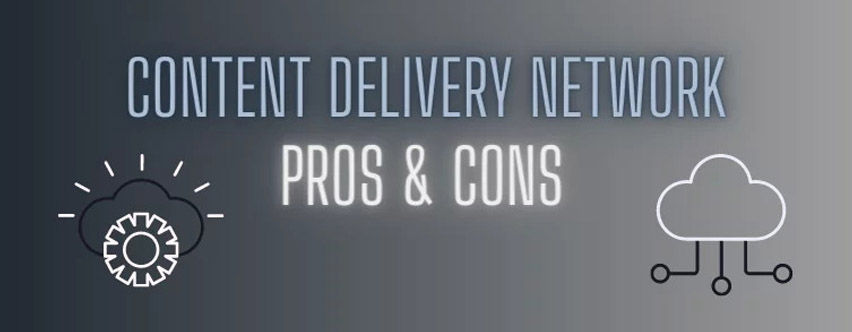In today’s digital age, website speed and performance are crucial for online success. Slow-loading websites can drive visitors away and negatively impact your search engine rankings. Content Delivery Networks (CDNs) have emerged as a powerful solution to address these issues. In this blog, we’ll explore the pros and cons of CDNs, helping you make an informed decision on whether to integrate them into your web infrastructure.
Table of Contents
What is a CDN?
Before diving into the pros and cons, let’s clarify what a CDN is. A Content Delivery Network is a network of strategically placed servers distributed across various geographical locations. The primary purpose of a CDN is to optimize the delivery of web content, such as images, videos, stylesheets, and scripts, to end-users. By doing so, CDNs reduce latency, improve load times, and enhance overall website performance.
Pros of Using a CDN:
- Speed Optimization:
- Optimized Keyword: CDNs significantly improve website loading times, making your site faster and more responsive.
- According to a study by Akamai, websites using CDNs experience a 50% faster load time compared to those without.
- Global Reach:
- CDNs have servers strategically located around the world. This allows your content to be stored closer to your users, reducing latency.
- With a CDN, you can serve your international audience seamlessly, improving user experience.
- Enhanced Security:
- CDNs offer security features such as DDoS protection, Web Application Firewall (WAF), and SSL/TLS encryption, helping protect your website from cyber threats.
- CDN security measures can mitigate the risk of data breaches and ensure the confidentiality of user information.
- Traffic Handling:
- CDNs efficiently distribute traffic, preventing server overloads during traffic spikes or DDoS attacks.
- This ensures your website remains accessible and responsive even during peak periods.
- SEO Benefits:
- Google takes website speed into account when ranking pages. Faster load times, facilitated by CDNs, can positively impact your SEO efforts.
- Improved search engine rankings can lead to increased organic traffic.
Cons of Using a CDN:
- Costs:
- Optimized Keyword: While CDNs offer numerous benefits, they come at a cost. CDN service fees can add up, particularly for high-traffic websites.
- Evaluate the cost-effectiveness of a CDN based on your specific needs and budget.
- Configuration Complexity:
- Setting up and configuring a CDN can be complex, especially for those with limited technical expertise.
- However, many CDNs offer user-friendly interfaces and documentation to simplify the process.
- Limited Control:
- Using a CDN means relinquishing some control over your content delivery to a third party. This can be a concern for those who want complete control over their infrastructure.
- You must rely on the CDN provider to ensure uptime and security.
- Potential Single Point of Failure:
- While CDNs are generally reliable, they can become a single point of failure. If the CDN experiences an outage, it can disrupt your website’s accessibility.
- To mitigate this risk, consider using multiple CDNs or implementing failover mechanisms.
CDN Comparison Table:
To help you better understand the pros and cons of CDNs, here’s a comparison table:
| Aspect | Pros | Cons |
|---|---|---|
| Speed Optimization | Faster website loading times | Costs associated with CDN services |
| Global Reach | Improved international user experience | Configuration complexity |
| Enhanced Security | Protection against cyber threats | Limited control over content delivery |
| Traffic Handling | Efficient traffic distribution | Potential single point of failure |
| SEO Benefits | Improved search engine rankings |
FAQs:
- What is the cost of using a CDN?
- The cost of a CDN varies depending on factors such as the volume of traffic, data transfer, and additional features. It’s best to check with CDN providers for specific pricing details.
- How can I set up a CDN for my website?
- Setting up a CDN typically involves signing up with a CDN provider, configuring your DNS settings, and integrating the CDN with your website. Most CDN providers offer documentation and support to assist with this process.
- Are CDNs suitable for small websites?
- CDNs can benefit websites of all sizes. Small websites can enjoy improved load times and enhanced security by using a CDN.
- Do CDNs impact website SEO positively?
- Yes, faster website loading times, facilitated by CDNs, can have a positive impact on SEO by improving your site’s search engine rankings.
Conclusion:
Content Delivery Networks offer numerous advantages for websites seeking to enhance performance, security, and global accessibility. However, they are not without their drawbacks, including potential costs and complexities. Before integrating a CDN into your web infrastructure, carefully assess your specific needs and budget constraints. By weighing the pros and cons, you can make an informed decision that aligns with your website’s goals and objectives. Remember that a well-implemented CDN can play a pivotal role in delivering a seamless and speedy user experience to your visitors, ultimately driving your online success.


Leave a Reply